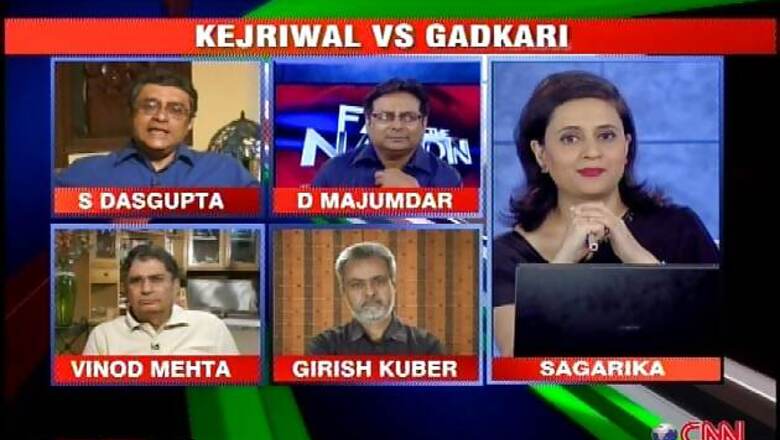
views
Sagarika Ghose: Hi there. Yes the 'Kejri bomb' explodes again. More revelations today from Arvind Kejriwal and India Against Corruption, this time targeting BJP president Nitin Gadkari. Kejriwal targets BJP president Nitin Gadkari, alleges 100 acres of land acquired for building a dam in Maharashtra was given to him. Irrigation water in Vidarbha was diverted to Gadkari's power and sugar factories.
Tonight we are asking, is targeting personalities the way to fight corruption? Joining us tonight Swapan Dasgupta, senior journalist. Vinod Mehta, editorial chairman of the Outlook Group. Girish Kuber, managing editor of Loksatta. Diptosh Majumdar, national affairs editor of DNA. Swapan Dasgupta, the big question that everybody is talking about, let me put it to you – has Kejriwal achieved a moral equivalence by this press conference, between Congress and BJP, between Vadra and Gadkari?
Swapan Dasgupta: Well, I think, he has more established immorally equivalence between the two. Yes to some extent, you know, this was not a 'Kejri bomb'; there were 'Kajri bombs' earlier, specially in the Vadra case. This was more a Kajri stink bomb and I think some of the bad odder which came out of it is going to stick to the BJP because when you have the top leadership of a political party having to defend how 100 acres of land came into the possession of a social enterprise which is being run by the party president, then I think it is a sad day. It is almost equivalent to the fact that Manish Tewari has to defend Mr Robert Vadra. So I think it is a very sad day for the BJP when issues like this take precedence over larger question. It has certainly diluted without necessarily blunting it altogether the BJP's action against corruption. But let me state of the other hand, Mr Kejriwal overstated his case. Mr Kejriwal had a legitimate question regarding the fast track cosy relationship which existed between Nitin Gadkari and Ajit Pawar. But when you talk about how water was diverted to sugar etc, you are talking about larger development strategies where Mr Gadkari had little or no role to play. He was an incidental beneficiary of such thing. It is like us buying a flat in land which was acquired from farmers. But at the same time… it is a stink bomb, it is probably one which will go away with time, but for the moment I think it has reinforced the notion in the society that 'sab choor hai', without necessarily bothering about the quantum of their theft.
Sagarika Ghose: The perception of 'sab choor hai', including Congress, BJP. Kejriwal as the BJP's B team, that was the perception among masses for a long time and many even said that he was an RSS front; do you think that has been buried? He is asking uncomfortable questions on both sides, for the entire political elite he really is the true maverick.
Diptosh Majumdar : It suited the Congress to put forward that Kejriwal is the B team of BJP, but it doesn't suite the Congress anymore because it must please the Congress this evening that the BJP will have another political group shearing the space electrically at least in Delhi where Kejriwal has sufficient influence and impact with his 'Kajri bombs'. And the fact remains also, Kejriwal, I agree that perception wise this may not be a large scam, you do not have several zeros stuck to it…
Sagarika Ghose: But the Aam aadmi, the mango people vs the khas aadmi that dichotomy has been established.
Diptosh Majumdar : Absolutely, there is a collusion being suggested between NCP and BJP, president of the main opposition party has a collusion. He is writing a letter to get his land and getting it from the irrigation minister of Maharashtra, the fact remains that. The second point is established that he is a businessman who is also a politician. But the businessman identity overshadows his political identity and he casually mixes the both. The third is that the farmers are nicely contrasted, the farmers plight.
Sagarika Ghose: For two years the farmers were agitating for this 100 acres of land. It was given to Mr Nitin Gadkari four days after he wrote that letter.
Diptosh Majumdar : I think Kejriwal has presented a very logical case.
Sagarika Ghose: Kejriwal has presented a very logical case. Vinod Mehta in every few days the 'Kajri bomb' or the Kajri stink bomb naming and shaming high profile people whether it is Robert Vadra, whether it is Salman Khurshid, and now it is
Nitin Gadkari. But to put to you the fact of this business, politics nexus, the fact that the elite is getting away which these underhand dealings – has Kejriwal successfully become the nemesis of that political elite?
Vinod Mehta: Sagarika, this businessman-politician nexus is as old as the hills. It has been existing for a long time and therefore what Mr Kejriwal has done actually is try and give us a glimpse of our democracy. That this is the way the BJP, or the Congress, or the SP, this is the way to do things in this country. You scratch your back I scratch your back. And I found that BJP's argument about moral equivalence to be completely specious because there s no one standard goal of corruption. Nitin Gadkari corruption doesn't have to equal in all respects Robert Vadra's corruption to become important and relevant. There is a big question mark over Mr Gadkari. And I think, if the BJP doesn't bring some clarity into this, whenever BJP will talk about corruption we will have this kind of debates that we had today, where the Congress will accuse the BJP and The BJP accuse the Congress.
Sagarika Ghose: So he has raised important questions for the BJP?
Vinod Mehta: Sagarika, it is important because if they want to occupy the high moral ground in corruption they can't have a party president against whom there is a shadow and a question mark. That must be cleared so that they can legitimately attack the Congress for being a corrupt party. But if they don't do this they have no moral authority to attack the Congress for being corrupt.
Sagarika Ghose: So do you think the moral authority of the BJP has to some extent being lost in that battle against corruption. Girish Kuber let me put to you, the questions that Kejriwal has raised about Nitin Gadkari, now the BJP leadership today, Sushma Swaraj and Arun Jaitley, when they were speaking to the press them made light of it, they said it is not serious allegations. But do you feel that these are important questions as Vinod Mehta is suggesting – 15 companies in 17 years, he has established. He is in sugar, he is in construction, he is in power, he is in coal, he is in agro, he has links with the NCP, he is someone who wrote the letter to Ajit Pawar for that 100 acres of land. The process of giving that land was started with in four days when farmers were agitating for two years. So do you think he has raised very important questions about Nitin Gadkari?
Girish Kuber: Absolutely, the questions are important but if you look at the Maharashtra politics for the last 25-30 years, Maharashtra politics and economy is contract driven economy and there is no single political party which has no connection with the contractors. So if you look at the top leadership of all political parties, is hand and glove with each other. So in a way it's shocking because it is BJP, but the way it has gone up it is amazing. There are hundreds of questions about Gadkari's mobilisation of wealth and other thinks as well. So questions are very important and it is gong to be very tough for the BJP.
Sagarika Ghose: And do you think the Vidarbha issue as well. Vidarbha being that issue in Maharashtra, do you think that it is a very important issue that Vidarbha farmers were losing land and not getting water because of Gadkari's companies?
Girish Kuber: Yeah it is, but the unfortunate thing about Vidarbha is that Vidarbha is one of the poorest part of the state that has one of the richest battery of politicians. So every politician has looted Vidarbha, you name a party and he has a leader who is looting Vidarbha.
Sagarika Ghose: So it is not just Gadkari. But let me put you point about contractors to Swapan Dasgupta because I think that is very interesting and I would like to explore that. There is a saying, Swapan Dasgupta, that look at the relationship between politics and business. In America successful businessmen often become politicians but in India to become a successful businessman sometime you have to become a politician first. You know, the kinds of links that exist between business and politics, I mean, we have the large number of MLAs in Maharashtra coming from the real estate belt of Mumbai, you have the real estate loby in Andra, Karnataka mining lobby. Now do you feel that Arvind Kejriwal today speaking about the small farmer, by speaking about the links of corporate and business, it is setting that aam aadmi, that mango people vs corporate-political elite.
Swapan Dasgupta: Well I think more than actually being a through exposes of Mr Gadkari, I expected many more things to come out. I think what Mr Kejriwal did in this press conference was basically position himself as someone who is fundamentally inimical to the cosy relationship of business and politics, cutting across parties. He appeared to be anti-business in many ways. But there is a growing constituency in India which links economical reforms to corruption. And therefore they ask themselves this question, is that if there is going to be hardships involved in the remaking of India, why should that be accompanied by a regime which benefits only a handful and where by the rest of the people end my paying more for their gas, more for their electricity etc. So this iniquitous regime is something which a politician like Mr Kejriwal is actually going to exploit. And I think people have mistaken Kejriwal as someone who takes away the votes of the right. More and more I examine Mr Kejriwal, I think; he has stepped into the void which the decline of the organised Left has created. And he is stepping into that with a form of a new politics which equals something like the people's movement, plus the green part, plus a bit of neo moist, hochpoch of everything. You can call it by the name populist but I think anti-business is the central aspect pf his intervention.
Sagarika Ghose: Right. Like somebody told my urban naxalism, I mean not exactly, but very much occupying this pro-poor constituency. Do you see this having takers. It is interesting that this is a growing constituency.
Diptosh Majumdar : This is a growing constituency not just in the middle class but in the peripheral fringes of society a lot. And this not just left, mind you, this is also boarding on different aspects. The middle class which is coming forward is often very right wing on Twitter. There is a differentiation emerging on social media between Arvind Kejriwal's party and the BJP. Today there is a lot of criticism of Arvind Kejriwal because he has bright these charges against BJP. But the fact remains that Arvind Kejriwal has pointed his figures at a point where it hurts. And he may be anti-business to some extent but he is not saying that doing business is wrong. But when you mix business and politics as they do in Maharashtra, BJP is trying to get away by saying that cooperatives were being run, but cooperatives, business, politics in Maharashtra is probably a matter of a study for a number of journalist for a number of years.
Sagarika Ghose: That is a very important point, there is a need for a real reform. There is need for really transformation of delivery system; there is need for reforms in terms of accountability. All these economic activities have to be reformed.
Vinod Mehta let me put it to you, this kind of blaming and shaming that Kejriwal is doing is something very new happening. Is he changing the discourse, for the last two weeks on TV we do nothing else but discuss Arvind Kejriwal…
Vinod Mehta: Sagarika, just one small point in that very exclsive coctail of business and politics, you forgot the underworld that makes the link complete; business, politics, underworld. But coming back to your point, I think, there is a real danger that Mr Kejriwal and IAC create this kind of mindless rage in the Indian middleclass. And basically he is targeting the Congress and the BJP…
Sagarika Ghose: No, are they creating it or reflecting it?
Vinod Mehta: He is reflecting it by saying look this is the corruption that we are talking about, it spreads everywhere. But this anger should be channelled, if it is not then he saying that let's make Jantar Mantar, Tahrir Square, I found that very disturbing. Because after having got the people angry, after having exposed all our politicians, you just leave it there. What alternative are you offering; you have neither the resources nor the depth in your organisation to do something about this. So we may be left in a situation where everybody in India is watching television and talking about corruption but don't know what to do about it. And he is not suggesting any answers. It is not just suggesting, he is incapable because he doesn't have an organisation, and I don't think he has even applied his mind to this question.
Sagarika Ghose: He doesn't have the organisation or the depth, but at least once a week he gives this press conference exposing these high profile people. Swapan Dasgupta do you see a political movement building, could this be, kind of an anti-emergency wave. Kejriwal has often spoken about 1975; they have often spoken about Jayaprakash Narayan movement.
Swapan Dasgupta: Sagarika, I not only see a growing anger against the system which is turned out be far more rotten than anyone of us had imagined. Secondly, and I think, this is something I' drawing from an article you wrote is that there is a class dimension. And I think the profound arrogance of the privileged, their astonished sense of entitlement when they are neck deep in some of the worse sought of unethical practices. I think that is building itself up in a form of a very sharp populist reaction. Now what form this reaction will take and it is also coinciding with destructions of institutions by politicians by themselves. Many of the institutions which could have insulted the shock have been destroyed by the politicians, so today they are facing the music and they have no where to go. So I think we should take this far more seriously. And therefore one of the reasons why I would say urge the BJP not to be so smug, that Mr Kejriwal's revelation weren't as dampening as they expected. For haversacks realise that in the process he has given a blow to your moral authority. And without moral authority there is no sense of politics which can exist. As the Congress will realise…
Sagarika Ghose: That is a very good point that what every the legalities, or whether these charges will stand in the court of law, the fact is moral authority has taken a hit. Girish Kuber, do you think main stream political parties have something real to fear?
Girish Kuber: Absolutely, and the kind of nexus that they are having is scary and the problem is that the middleclass voter is feeling completely helpless. But the only problem I see is that there is no alternative that Kejriwal is throwing.
Sagarika Ghose: There is no alternative, but there is anger. I want to pick up from the point that Swapan was making, that VIP culture, the lalbati culture, in Delhi we see it all the time. Which is why in Delhi Kejriwal strikes a cord. So you think that can really catch on at an all India level?
Diptosh Majumdar: I think it is very difficult. I think we can't expect too much from
Arvind Kejriwal. You can create a negative mode which can spread across the country, and Congress may have to pay a very heavy price for it.
Sagarika Ghose: But, you know, when Salman Khurshid says that I'm Oxford educated and you guys are gutter (*). There is real anger coming from a statement of someone who is considered as privileged elite.
Diptosh Majumdar: Also there is a kind of immaturity in a person who is making such a statement, complete political immaturity of the person knowing that in India such arrogance never works. But the fact remains that you can create a mood but where is the receptacle to get the votes. Does Arvind Kejriwal have an organisation? So when the movement reached Mumbai and Anna was still with them, then they didn't have such kind of a response. So, Arvind is like a T-20 player hitting sixes everyday. But the problem is that you can't sustain an agitation like this. But he will definitely try and being a different language which will probably try to cleanse the system. Because we had completely accepted 'chalta hai'.
Sagarika Ghose: That's what has happened that 'chalta hai', has broken.
Diptosh Majumdar: That is still happening. But at least the discourse has changed.
Swapan Dasgupta: I think the cumulative effects of all these developments and interventions by Mr Kejriwal has made Modi come one step closer to Delhi.
Sagarika Ghose: I don't know how you are coming to that conclusions. But we are going to leave at that…
Vinod Mehta: One small point, I think, what I fear… no Mr Modi doesn't interest me. The point I am trying to make is the fact that instead of getting any reform, and solutions between now and when ever the general elections are held we will be having this tootoo maimai, and nothing will happen and Mr Kejriwal will be somebody in the middle, but we know nobody will accept the fact that BJP… BJP won't accept they are corrupt, Congress won't they are corrupt. So everybody will be at each others throat.
Sagarika Ghose: So we will be heading to a chaotic solution, but through chaos comes creation, perhaps we are heading to a brighter future. Thank you very much Swapan Dasgupta, Diptosh Majumdar, Vinod Mehta and Girish Kuber.


















Comments
0 comment